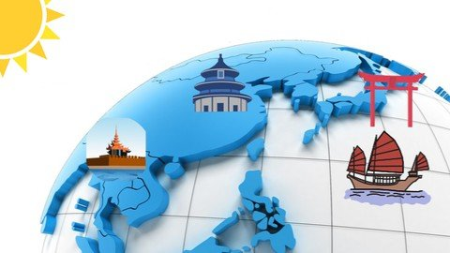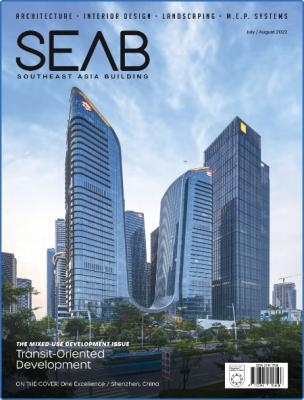
Asia 101: Stories of the Past (Until the 20th century)
Posted on 23 May 05:38 | by LeeAndro | 26 views

MP4 | Video: h264, 1920x1080 | Audio: AAC, 44.1 KHzLanguage: English | Size: 8.21 GB | Duration: 10h 11m
The History of South, Southeast and East Asia until 1900!
What you'll learn
The complete history of Asia until 1900
A six part overview of Asian history, covering South, Southeast and East Asia
Requirements
No previous knowledge is required come as you are!
Come with an open mind!
Be curious and open minded about Asia!
Description
With an ever interconnecting world, learning about the history and origins of non western cultures is not only fun for native English speakers but an important soft skill to have for college and life. Historical sensitivity and understanding are important for the next generation. In the secondary school systems of the United States and other English countries it is common for somes only the history of the home country is studied, somes World History is offered but well meaning teachers can have a challenge with so much breath to cover. Colleges and Universities often require students to take a Western Civilizations or American History course but there is very little opportunity to take history courses on other parts of the world. Oftens Western Civilizations do have some discussion on the Islamic World and the Middle East or brief notes on Africa and the relationship of those places to Europe. Of course, the question is raised: what constitutes Asia or Asian This question may be debated until the end of as there are as many answers as Yoshimino cherry blossoms in the spring.
Asian History 101 focuses on the parts of Eurasia east of Iran largely brig in South, Southeast and East Asia as a unified course of study, perhaps with a few forays into Central Asia . I anticipate that for many students this class will be their first introduction to the area, therefore this class is more as a survey than an in depth analysis. In the first classes the focus will primarily be on India and China- as these were the original civilizations in the area before branching out to their neighbors. That being said I will provide context to all information given as much as possible and will address the individual interests of a student as much as possible peting. I enjoy studying and teaching Asian History as I find the study of these areas- and the historical peoples who lived in them to had created a pattern of development that was different from the areas traditionally aligned as western. So I find teaching this class to not only be teaching entirely new content but new ideas as well. This is not to say in anyway that one pattern of development is better or worse than any other but learning that humanity has had different patterns of advancement in different places is highly enriching to any student- anywhere
.
Unit Descriptions
Class 1: Welcome to Asia! Overviews and Perspectives
In this class, we'll discuss the concepts of Eastern and Western civilization and the different regions of Asia in history. We'll review the modern scholarly perspective in regard to identifying different zones of the world. We'll also discuss the original river valley societies in Asia, including the Harappa (Indus River) and the Shang (Huang He river).
frame: Paleolithc. Neolithic and Bronze Ages, until 1000 BCE
1.1: What is Asia
1.2: Whispers of the Past: A peak into Asia's Prehistory
1.3: The First Civilizations
Class 2: Buddha and Confucius and their legacies
Early civilization was formed not only by means of agriculture and metal tools but also through the rise of ideas that could guide and unite peoples. In this class, we'll discuss the lives and doctrines of the prophets Buddha, Confucius, and Lao Tzu, and the impacts of their teachings on the historical development of Asia. The legacies of great empires, such as the Han Dynasty in China, the IndoGreeks, and the Gupta, will be highlighted.
frame: 1000 BCE–500 CE
2.1: The world and legacy of Buddha
2.2: The world and legacy of Confucious
2.3: Journeys of Fortune, and Faith: The world of the Silk Road
Class 3: The Birth of Northeast and Southeast Asia
Taking inspiration from China and India but also holding onto their own traditions, Southeast cultures such as Cambodia, Indonesia, Korea, Japan, and Vietnam began fog as nations, with almost all using Buddhism as a unifying framework. In this class, we'll talk about how ideas and trade turned fledgling kingdoms into prosperous realms.
frame: 500 CE–1200 CE (this class attempts to prioritize Asian countries that are not India or China )
3.1: The Tang Dynasty and Northeast Asia
3.2: The birth of Southeast Asia
3.3: A Myriad of Mandate! The era of Five Chinas in the 12th century
Class 4: Age of the Nomads: Mongols and Mamluks
Ancient Asia was prosperous, yet South, East, and even Southeast Asia were all threatened by nomadic invaders on horseback, who often triumphed over the invaded. We'll discuss two major events that took place at the turn of the 13th century: the Ghurid invasion of India, originating in Afghanistan, and the Mongolian conquests of East Asia. We'll discuss how nomads defeated their more advanced ens, how they permanently transformed the places they conquered, and the reasons nomadic victories were short-lived. Finally we will discuss the Post Mongol era and the choices the Chinese Ming Dynasty and the Indonesian Majapahit made that led to their modern states
frame: 1200–1500 CE
4.1: Temujin and the Mongols
4.2: Islamic Invasions of India
4.3: Shortlived Pax Mongolia
4.4: Turning points of the 14 and 15th centuries
Class 5: Gunpowder Empires of Silver: The first wave of the nomadic r eventually collapsed, but Europeans traders soon arrived hoping to bring Asia into their economy. Early East-Western interactions would change the course of humanity's history forever. The Columbian exchange brought by Europe had the power to create great wealth for, or bankrupt, great Asian powers. We'll discuss new technologies, such as massive gunpowder as that the Mughal and Qing empires used for expanding into the continent's interior.
frame: 1500–1795 CE
5.1: First Encounters: Europeans reach Asia by Sea
5.2: Guns, Elephants and Tolerance: The Mughals
5.3: Chaos, Culture and Bamboo Curtains: Early Modern East Asia
5.4: Legends, luxuries and literature of Southeast Asia
5.5: The suns which never set: Intrusion of Europeans
5.6: A pivotal turning point- Mac Macartney Embassy and closing remarks
Class 6: The 19th Century: Imperialism, Adaptation and Resistance
By 1800, one of every three people in the world was Chinese, and India had recently been the richest country on the planet. Yet a great divergence in technology was taking place, and European kingdoms/republics rushed to colonize and pillage Asia. In the face of sweeping changes, Thailand and Japan industrialized to meet the European challenge. Using every means available, the people of Asia tried to resist colonization.
frame: 1795–1904 CE
6.1: The Great Divergence What was it How did it happen
6.2: Opium and Ironclads: Direct European Imperialism
6.3: To emulate and preserve: The paths of Japan and Thailand
6.4: In the name of Righteous Harmony: The Yihetuan Movement and Aftermath
6.5: The East is East, the West is the West and the Twain shall meet (Through Art)
"Education means guiding and promoting persons to progress in learning, thinking, and perfog according to their own ability. Bhumibol Adulyadej King of Thailand
I sincerely hope that you do not only enjoy this class, but found something inspiring. I hope that broad as this may be that this might be a window for you into the Asian Humanities.
hope greater understanding of Asia will be empowering to individuals and to build a better path to not just peace but collaboration around the world! Thank you for choosing to take this class with me! Let us discover together!
Who this course is for
This is a great choice for those planning to visit or relocate to get a strong background in the region!
Understand, how Asian cultures are separate from one another, but also have points of commonality.
Professionals seeking more familiarity in the background of the Asia-Pacific Region
Armchair historians and diplomats!
HomePage:
Https://anonymz.com/https://www.udemy.com/course/asian-history-101/DOWNLOAD
uploadgig.com
https://uploadgig.com/file/download/E87E5a923e021f9e/Asia_101_Stories_of.part01.rar
https://uploadgig.com/file/download/e908ae181952e047/Asia_101_Stories_of.part02.rar
https://uploadgig.com/file/download/40d9276d83Dd5694/Asia_101_Stories_of.part03.rar
https://uploadgig.com/file/download/c9e4999f108785A3/Asia_101_Stories_of.part04.rar
https://uploadgig.com/file/download/20fa5cA8c333719a/Asia_101_Stories_of.part05.rar
https://uploadgig.com/file/download/58C939b1874c253a/Asia_101_Stories_of.part06.rar
https://uploadgig.com/file/download/Dc946fd2Ce7Dc65f/Asia_101_Stories_of.part07.rar
https://uploadgig.com/file/download/9b0a5d4a7Bd24BdE/Asia_101_Stories_of.part08.rar
https://uploadgig.com/file/download/7c77E5afd4fdd749/Asia_101_Stories_of.part09.rar
rapidgator.net
https://rapidgator.net/file/f66892a135301c7d8e3bd3abe5b1a285/Asia_101_Stories_of.part01.rar.html
https://rapidgator.net/file/4911793eb6ab1105ab2d411adc472c82/Asia_101_Stories_of.part02.rar.html
https://rapidgator.net/file/7c636877e3c2c49a05c1334600920745/Asia_101_Stories_of.part03.rar.html
https://rapidgator.net/file/8e139c093f292d44dbe837e1826afc38/Asia_101_Stories_of.part04.rar.html
https://rapidgator.net/file/9215f323a416cee4429b110da1e20426/Asia_101_Stories_of.part05.rar.html
https://rapidgator.net/file/bbcd46ba2aeae744c84c4179fa19f535/Asia_101_Stories_of.part06.rar.html
https://rapidgator.net/file/d2dd4337efeaa8b6515536ba444de5cc/Asia_101_Stories_of.part07.rar.html
https://rapidgator.net/file/15ed675065bfd9da9e58b822f73c8719/Asia_101_Stories_of.part08.rar.html
https://rapidgator.net/file/3bff39c82dca2b9442fa9877b32a91f6/Asia_101_Stories_of.part09.rar.html
nitro.download
https://nitro.download/view/4A855A3FFE696AB/Asia_101_Stories_of.part01.rar
https://nitro.download/view/F2D9B9819F7CB0A/Asia_101_Stories_of.part02.rar
https://nitro.download/view/575CCB7A746D421/Asia_101_Stories_of.part03.rar
https://nitro.download/view/00BF03F67B5B802/Asia_101_Stories_of.part04.rar
https://nitro.download/view/8DF5EC40F11928F/Asia_101_Stories_of.part05.rar
https://nitro.download/view/054B735204FCC71/Asia_101_Stories_of.part06.rar
https://nitro.download/view/0ABEE5F95C6E008/Asia_101_Stories_of.part07.rar
https://nitro.download/view/FAEDD3E5457E6C9/Asia_101_Stories_of.part08.rar
https://nitro.download/view/A0D2A4FF3FFB861/Asia_101_Stories_of.part09.rar
Related News
System Comment
Information
 Users of Visitor are not allowed to comment this publication.
Users of Visitor are not allowed to comment this publication.
Facebook Comment
Member Area
Top News



